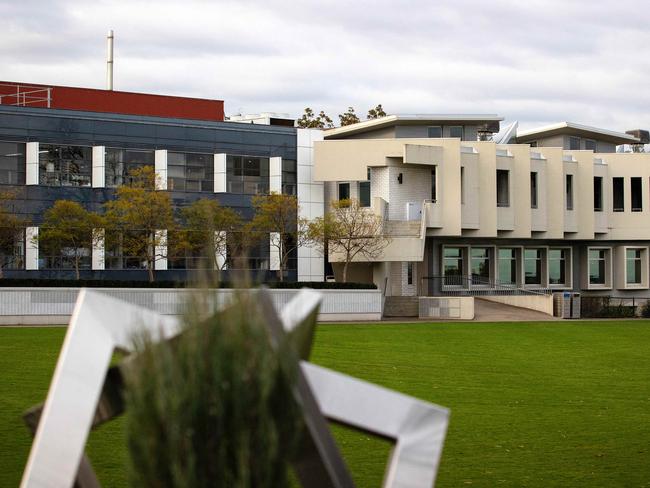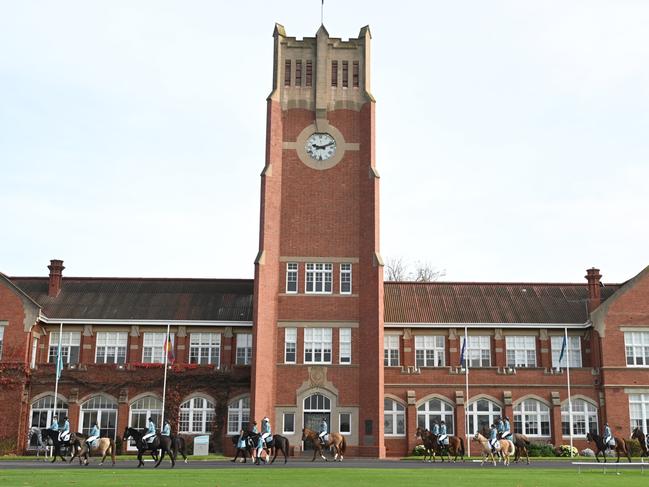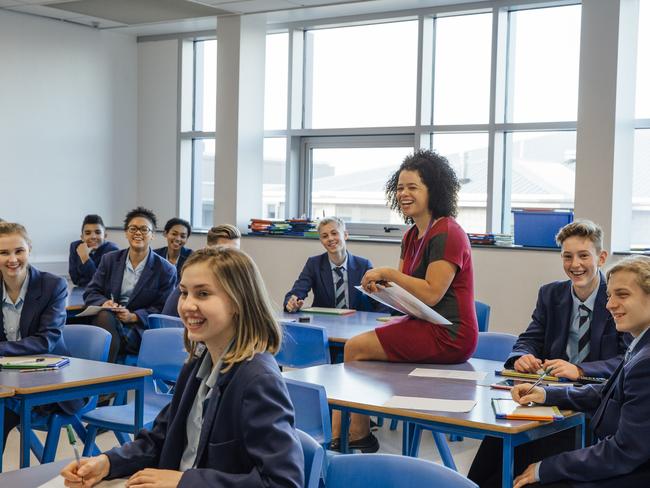Elite private school teachers now paid $180,000 fuelling ‘dog eat dog’ hiring blitz
New pay deals struck by Victoria’s leading private schools have delivered educators wages of up to $180,000 a year, well ahead of state schools and fuelling a “dog eat dog” headhunting blitz.
Education
Don't miss out on the headlines from Education. Followed categories will be added to My News.
New pay deals struck by private schools are delivering teachers 10 per cent wage rises and $180,000 pay packets, further leaving state school teachers behind.
Analysis of the 2023 pay deals struck by nearly a dozen independent schools shows the gap between state and private schools’ top wages is now nearly $50,000 a year.
Pay inequity between schools is fuelling what one principal called a “dog eat dog” culture where schools are poaching rival staff amid a dire shortage of educators.
At Trinity Grammar School, an agreement signed this month will deliver experienced teachers $146,000 a year by 2025, well above the $129,000 which will be paid to top teachers in the state sector by the same time.
Loadings for high duties now bring a Trinity Grammar leading teacher’s salary to $177,000.
The elite Kew boys’ school also offers most teachers 50 per cent fee discounts on tuition, saving those with two children attending the school from prep to year 12 almost half a million dollars.

Trinity Grammar teacher perks include being paid $150 a night to go on school camps, double that of many other private schools.
In comparison, government schools teachers are supposed to be paid time-in-lieu or time-and-a-half for camps but many are under pressure to volunteer their time due to budget and staff constraints.
They are also receiving pay rises of 8 per cent over four years compared to 10 per cent over three years at Trinity Grammar.
Secondary teachers must do 20 hours a week face-to-face teaching or 18 hours 40 minutes if they have other duties.
One trade-off is that private schools such as Trinity Grammar put additional demands on teachers in terms of weekend sport and evening events, with one state schools teacher saying they “earn every cent”.
Other new pay rates for top teachers include $151,000 at Aitken College by 2025, $140,000 at St Paul’s Anglican Grammar by 2027 and $136,000 at Tintern Grammar.

Trinity Grammar principal Adrian Farrer said his school was proud of the new enterprise agreement reached “within responsible financial management parameters”.
He said the school, which will have to absorb the government’s new payroll tax, had to balance “looking after all employees and ensuring financial accessibility for our school families remains our ongoing focus”.
Malcolm Elliott, the immediate past president of the Australian Primary Principals Association, said private schools “have greater flexibility in terms of remuneration which gives them an edge in terms of recruiting”.
Mr Elliott, who now works as an independent educational consultant, said the issues were compounded by “close competition between states for teaching staff”.
“Victoria is ahead of some but behind others on rates of pay,” he said.
Victoria’s top public school teachers will earn $129,000 by 2025 compared to $122,000 for those in NSW and $142,000 for those in Queensland.
One principal told the Herald Sun the battle to attract and keep teaching staff was a “dog-eat-dog” process.
“Private schools are headhunting our top teachers and paying them more,” he said.
“Even within the public sector, schools are poaching each others’ staff and paying over the odds where they can afford to.”

It comes after the Herald Sun revealed Victorian state schools were grappling with staff shortages and some classes are running without teachers.
An Australian Education Union survey showed almost 60 per cent of teaching staff reported that shortages had caused an increase in grade splitting or combining classes.
Although private schools are also affected by staff shortages, the impact is much less, particularly at the top-paying schools.
Deakin University School of Education head Damian Blake said school leaders were “taking more extreme measures to secure qualified teachers for their classrooms”.
“But clearly principals who have access to greater resources have an advantage in attracting teachers,” Professor Blake said.
Australian Education Union Victorian Branch president Meredith Peace said teachers in the state system were “working excessive hours and grappling with unsustainable workloads” amid inadequate public funding.
Christian Schools Australia public policy director Mark Spencer said staff in this sector “are generally committed to the values and beliefs and that is what is driving them”.
Independent Schools Victoria chief executive Michele Green said: “Salaries paid to teachers in independent schools vary, depending on the skills, expertise, duties and responsibilities of individual teachers and the resources of their school”.
“Selective and arbitrary comparisons of salaries between schools invariably make no allowance for these differences,” she said.




